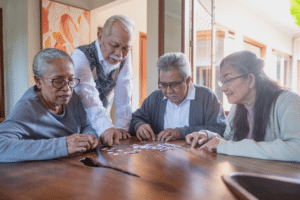At 82 years old, David was in pretty good health. He prided himself on being fit, healthy, and active, so when he began experiencing severe pain after minor knee surgery, he felt as though the things he valued most were being taken away from him.
After a few visits to his surgeon, David was prescribed Percocet to help manage the pain. At first, the drug did wonders for his pain and allowed him to have the lead the active lifestyle that he loved. But eventually, he found that he needed more medication to have the same effect, so he increased his dosage. Before he knew it, all he could think about was his next pill.
We often don’t think of older adults as being as susceptible to drug addiction as young people, but in actuality, that is not the case—especially when it comes to opioids. The increased need for pain control coupled with healthcare professionals’ tendency to underestimate the potential for addiction in seniors makes older adults vulnerable to opioid dependency and abuse.
In order to help protect your aging loved one from opioid addiction, it’s important that you learn how opioid addiction is different in older adults and explore some alternatives to pain control for those who want to avoid or diminish opioid use.
How Opioid Addiction is Different in Older Adults
David struggled with his escalating opioid addiction for several months until his daughter began to notice that something wasn’t right. When he first began taking Percocet he seemed completely normal, but eventually, she started to notice that he was more confused than usual and had trouble walking. When he wound up in the hospital after a bad fall, he finally revealed the nature of his opioid use to her.
Unfortunately, medical professionals as well as friends and family members of aging loved ones often fail to detect opioid addiction because common signs of opioid abuse, such as loss of balance, shakiness, confusion, memory impairment, and mood swings are often dismissed as regular signs of aging. At the same time, risk factors are sometimes overlooked. However, the unique experiences and physiological changes that happen in our later years can increase susceptibility to opioid addiction:
- Significant life changes can increase the likelihood of opioid abuse. Aging adults often deal with many difficult life changes such as social isolation, the loss of a spouse, decreased physical mobility, loss of independence, disease diagnosis, or moving to assisted living. All of these can be preconditions that make one more vulnerable to opioid abuse.
- Aging adults metabolize drugs differently. As we age, our metabolisms slow which means that it can take longer for the effects of medications to kick in. This delayed response can cause older adults to take more than the recommended dosage, which may be harmful to the body. Furthermore, since aging adults are likely to be prescribed opioids for longer-term use, they are more prone to building a tolerance and need to take higher doses to get the same effect. At the same time, the brain can become dependent on the medication to maintain equilibrium and your loved one may take more frequent doses to stave off withdrawal symptoms. These factors all increase the risk for addiction.
- Medication accumulates in the body more easily. As we age, our body’s ability to filter medication effectively is diminished, resulting in the accumulation of medication in the body. As a result, aging adults are more prone to becoming addicted to medications in smaller doses. This accumulation can also result in more severe side effects, especially when taken in large doses.
If your loved one is struggling with opioid addiction, it’s important to help them get treatment early as soon as possible. The best addiction treatment programs are tailored to each person’s individual needs and should ideally include psychotherapy and peer supports. For some people, pharmacotherapy in the form of relapse prevention medication may also be useful.
In addition to specialized opioid addiction treatment, one of the greatest predictors of successful long-term recovery is strong social supports. This means that the involvement of friends and family is an essential part of healing. Taking your loved one to appointments, having regular visits and check-ins, and expressing your support verbally are all ways to participate in their path to restoring health.
Safer Pain Management Alternatives for Your Aging Loved One
For people who want to avoid or minimize the use of opioid pain medication, there are a number of holistic ways to effectively manage chronic pain. It’s important to consider these alternatives both to decrease the risk of addiction and to create opportunities for pain relief during recovery. Many methods also come with a variety of other health benefits, such as stress reduction and improved fitness.
Here are some of the medication-free ideas that may help your aging loved one manage their pain:
- Yoga: The combination of stretching, strengthening, and deep breathing can do wonders for pain relief by increasing the body’s oxygen supply and calming the central nervous system.
- Mindfulness Meditation: The mind is an incredibly powerful tool. In fact, practicing mindfulness meditation can effectively reduce pain by 57%. Typically, it includes sitting quietly and observing different parts of the body, acknowledging pain, and letting go of the psychological response or resistance to it.
- Strengthening exercises: Low-impact activities, such as swimming, cycling, and Tai Chi can help improve muscle tone and lubricate joints, thus reducing pain associated with arthritis.
- Pain Management Counseling: Talk therapy that deals with the psychological side effects of pain can be very beneficial for reducing stress associated with pain and improving and expanding one’s coping abilities.
Of course, these pain-management and reduction recommendations don’t have to be used alone. Rather, they can work alongside medication to improve effectiveness. In some cases, older adults may even be able to work with their doctors to decrease their dosage.
Thankfully, David’s daughter was able to get David the treatment he needed to come off of the opioids safely and completely. Now, David manages his pain through a combination of yoga and pain management counseling and is experiencing great success. While his experience on opioids was scary, he was grateful his daughter’s swift intervention and support helped get him back on track.
At Institute on Aging, we provide aging adults with a variety of resources and services so that they can live healthily, safely, and independently in their homes. To find out how we can help your aging loved one, contact us today.







